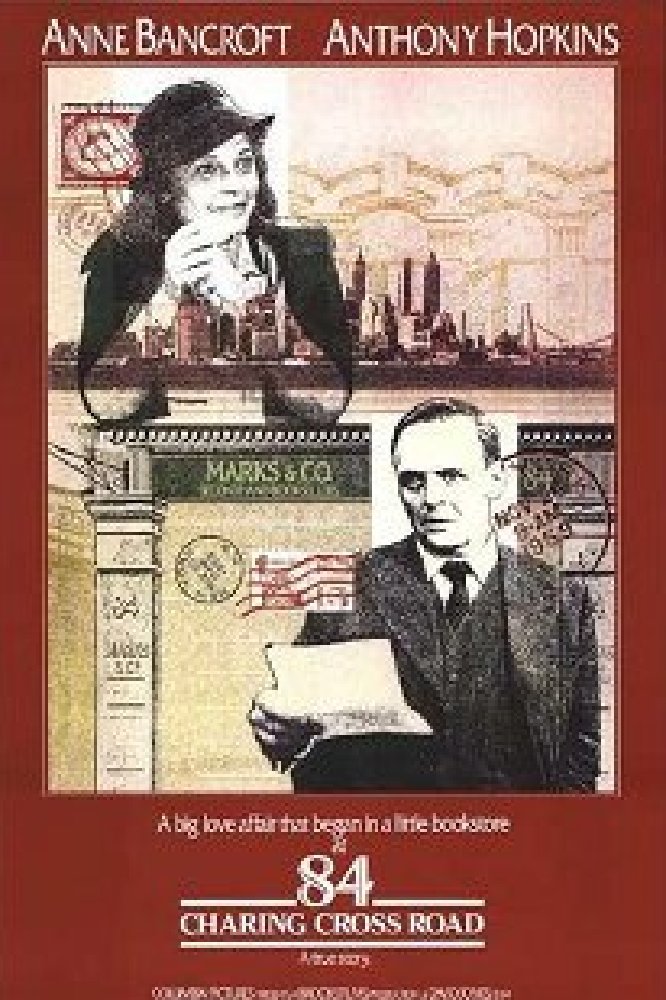
84 Charing Cross Road
In this age of electronic wizardry and abbreviated text messages few of us correspond by hand-written letters.
But not so long ago people took fountain pen to stationery and made requests, extended pleasantries and developed friendships that lasted lifetimes. Without the means to instantly connect they saved letters in bundles to be brought out and reread when longing for the nearness of the other’s spirit.
The year is 1949. Helene Hanff is a writer living alone in a brownstone one-room apartment in New York City. Frank P. Doel is a bookseller working in a London used book store that specializes in out-of-print books. Helene and Frank share a love for old books.
Helene (Anne Bancroft) has been searching New York City without success for particular, non-fiction books by English writers. After seeing an ad she writes to Marks & Co. and sends a list of books hoping their cost does not exceed her limited funds.
Frank (Anthony Hopkins) receives her letter and sends along two books he has in stock. In a separate letter, written in a formal style and signed FPD, he promises to try to find a volume of essays she has requested.
When the books arrive Helene runs up the stairs, snips the twine encircling the brown paper wrapping and gently caresses the hardback cover. She writes to FPD that she 'never knew a book could be such a joy to the touch.'
It isn’t Helene’s nature to be formal, even in business letters directed to a proper English bookseller. Her remarks about her inability to grasp 'bilingual arithmetic' (related to translating pounds to dollars) introduce Frank to Helene’s sense of humor and bring laughter to the small shop three thousand miles away.
The shop, located at 84 Charing Cross Road, is filled floor to ceiling with bookcases brimming with used hardback books and rare books with leather covers stamped in gold.
It has a softly lit, dusty atmosphere, gray wainscoting walls in Frank’s small office and a nook for brewing tea. It presents a quiet, studious ambience.
Helene’s small room is filled with lacy scarves covering her tables, sepia photos in silver picture frames, a typewriter sitting amid cluttered papers and bookshelves flush with carefully selected books. It’s bright and sunny, home to an intellectual person but one excited by life and the people dear to her.
Although she is Jewish, Helene peruses a Danish catalog of foodstuffs with the thought of sending a package to the bookshop employees at Christmastime. Rationing of food had ended in 1946, a year after the war, in the United States but continued in the British Isles for eight more years.
When the package of canned ham and fruit arrives, the employees delight at the sight of this unexpected bounty of unattainable items. Frank relaxes his professional reserve and signs his name to his thank you letter.
Easter brings another food package from Denmark to cement a holiday tradition for the shop employees. Their thank you letters introduce Helene to the employees and their families including Frank’s wife, Nora (Judi Dench), and his two daughters.
With spring on the way Helene requests a book of English love poems small enough to place in her pocket and take to Central Park. Frank sends her a book of Elizabethan love poems with 'pages edged all around in gold.' It arrives on her birthday and she finds a sunlit spot in the park and reads it with relish.
As the years pass Frank and Helene share news of their families, their interests and their favorite sports teams. Helene makes plans to travel to London for a visit during the time of Queen Elizabeth’s coronation. But unexpected expenses intrude upon her life and she is unable to make the trip.
Frank is as disappointed as Helene. To commemorate the occasion Helene sends a food package, and Frank and Nora entertain friends with ham sandwiches during the coronation while Helene listens to the ceremonial broadcast on the radio.
Helene displays no reserve in expressing her delight in the books she receives or her disappointment when Frank sends the wrong volume. If he doesn’t send a book as quickly as she expects she prods him with remarks like 'Don’t just sit there, go find it.'
And so with the exchange of letters Frank gains an understanding of the books Helene craves. He makes suggestions, and Helene trusts him to select books for her. When he travels around the countryside attending the sales of household library contents, he keeps Helene in mind as he chooses books for the shop.
After two decades of reading English literature from the beautiful volumes Frank has sent, Helene forms a vision of England in her mind’s eye and longs to see it.
She attends British films for the pleasure of seeing the land of her dreams even though they make her cry with bittersweet joy. Meanwhile, Frank finds a vision of his friendship with Helene in the poetry of Yeats.
The sweet story of 84 Charing Cross Road tells of the joy that can be created by simple acts of kindness or the dedication to a humble profession. And when that grateful joy is acknowledged it lightens the burdens and warms the hearts of people separated by religious/cultural backgrounds and thousands of miles.
The screenplay of this pen pal biography was adapted from the play written by James Roose-Evans. The inspiration for the play came from the book, 84, Charing Cross Road by Helene Hanff, a compilation of the actual letters exchanged between Helene and Frank from 1949 to 1968.
Ann Bancroft was awarded the Bafta for Best Actress. Judi Dench was nominated for the Bafta in the category of Best Actress in a Supporting Role and Hugh Whitemore was nominated for Best Screenplay Adapted.

